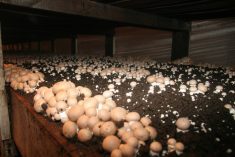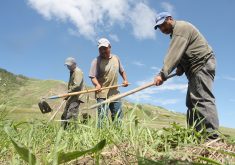Manitoba’s political parties target immigration to alleviate labour shortages that affect every sector in the province
Farmers need more and better workers.
That’s something Manitoba’s main political parties appeared to agree upon during an election forum held by the Manitoba Farm Writers and Broadcasters Association Sept. 12.
However, none offered to quickly solve the problem or provide simple solutions if they win the Oct. 3 election in Manitoba.
“The labour shortage is costing us money. Not a small amount, but billions,” said Diljeet Brar, the NDP agriculture critic, the MLA for a Winnipeg constituency and a former instructor at an agricultural university in India.
Read Also

Using artificial intelligence in agriculture starts with the right data
Good data is critical as the agriculture sector increasingly adopts new AI technology to drive efficiency, sustainability and trust across all levels of the value chain.
“It’s everything. We need people in transport. We need accountants. We need computer professionals.”
Brar said Canadian agriculture will be short 125,000 workers by 2029.
Derek Johnson, Manitoba agriculture minister and PC MLA for the rural constituency of Interlake-Gimli, said immigration is up about 38 percent since his government came to power and the PCs have been working hard to entice employers to expand investment and opportunities here.
“It’s very important to have the environment to create the attraction for people who want to live in Manitoba,” said Johnson.
Marshalling other provinces to pressure the federal government to do more is essential, he said.
“We don’t just lobby the federal government. We lobby other provincial governments to get them on the same page as you, then you move forward as a team.
“When you do that, you have a lot better results.”
Green Party Leader Janine Gibson, a partner in an organic farm, an organic inspector and candidate in Winnipeg, said labour shortages hit all sectors of Manitoba agriculture.
“I’ve never been on a farm that couldn’t have stood more labour,” said Gibson.
“Every organic farm, every farm I’ve visited, needs more workers.”
Rural Liberal candidate and former RM councillor Neil Stewart said the next government will need to follow a multi-pronged strategy.
“It’s very important that we try to keep all doors open and look for more options to solve this problem,” said Stewart.
The main Liberal tool to increase the number of domestic, immigrants or temporary foreign workers available to farms is to provide more day-care spaces in rural areas.
“We just do not have enough day-care spaces, and this affects agriculture as much as anything else,” said Stewart.
Brar said much immigrant talent is being wasted because of the difficulty matching skills to employers.
“We don’t just need farm workers. We also need managers. We need a variety of professionals to fill in the gaps in our ag industry,” said Brar.
“In this city, in this province, right now we have so many foreign-trained ag professionals right here, but we are failing to bridge the gap between their skills and what the employer needs.”
Brar accused the PC government of worsening the situation by suspending a program that attempted to turn foreign-trained agrologists into Manitoba agricultural professionals.
Gibson said her party thinks adequate housing must be provided to foreign farm workers, something Brar agreed with.
Gibson and Brar also agreed that Manitoba should focus on landing permanent immigrants rather than having farmers and agricultural processors rely upon temporary foreign workers.
Johnson said many foreign workers aren’t looking to become Canadian, but want to take advantage of good paying temporary work here to support their homes and lives in their native lands.
“Not all temporary foreign workers want to reside in Manitoba. They want to go home to their families,” said Johnson.
















